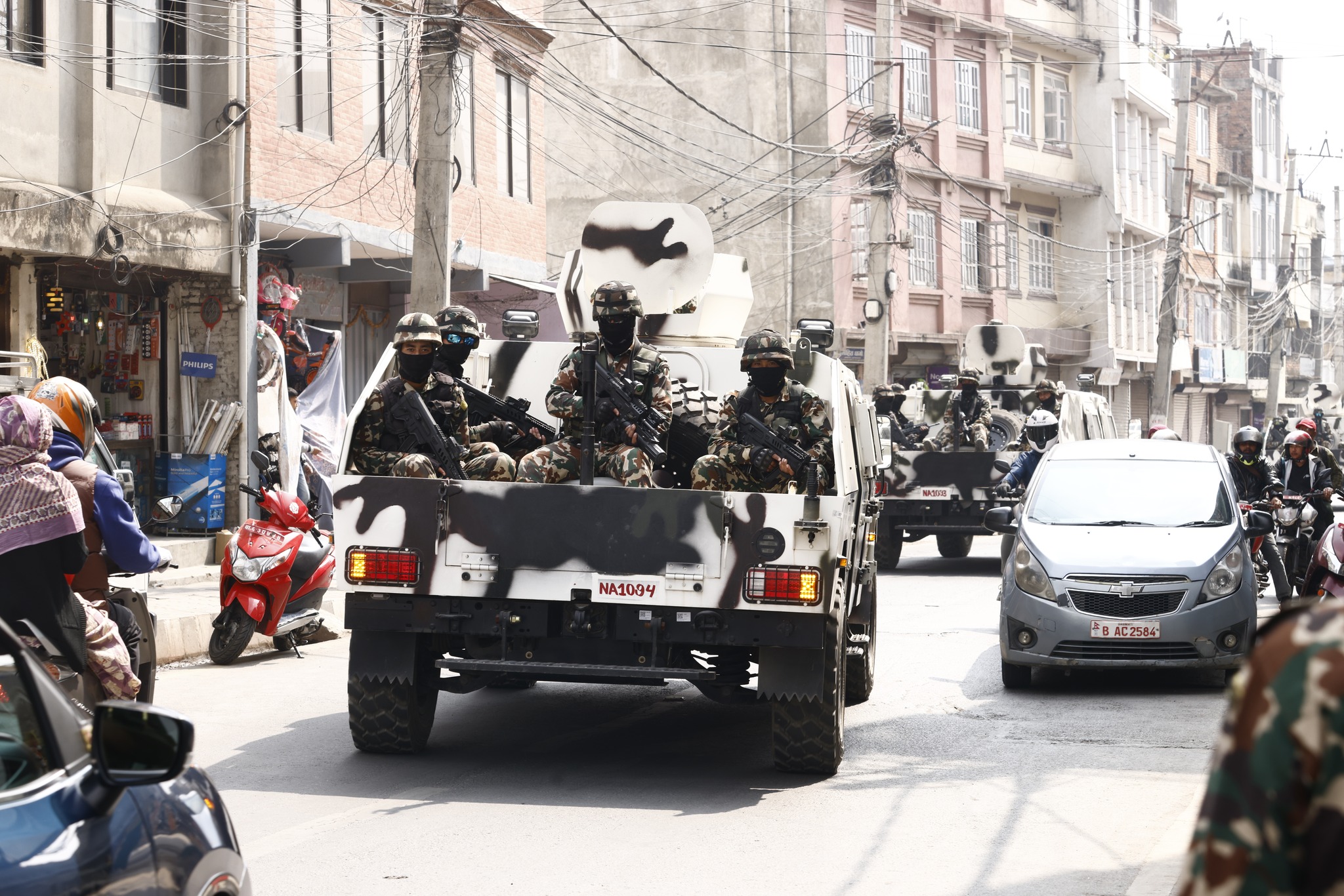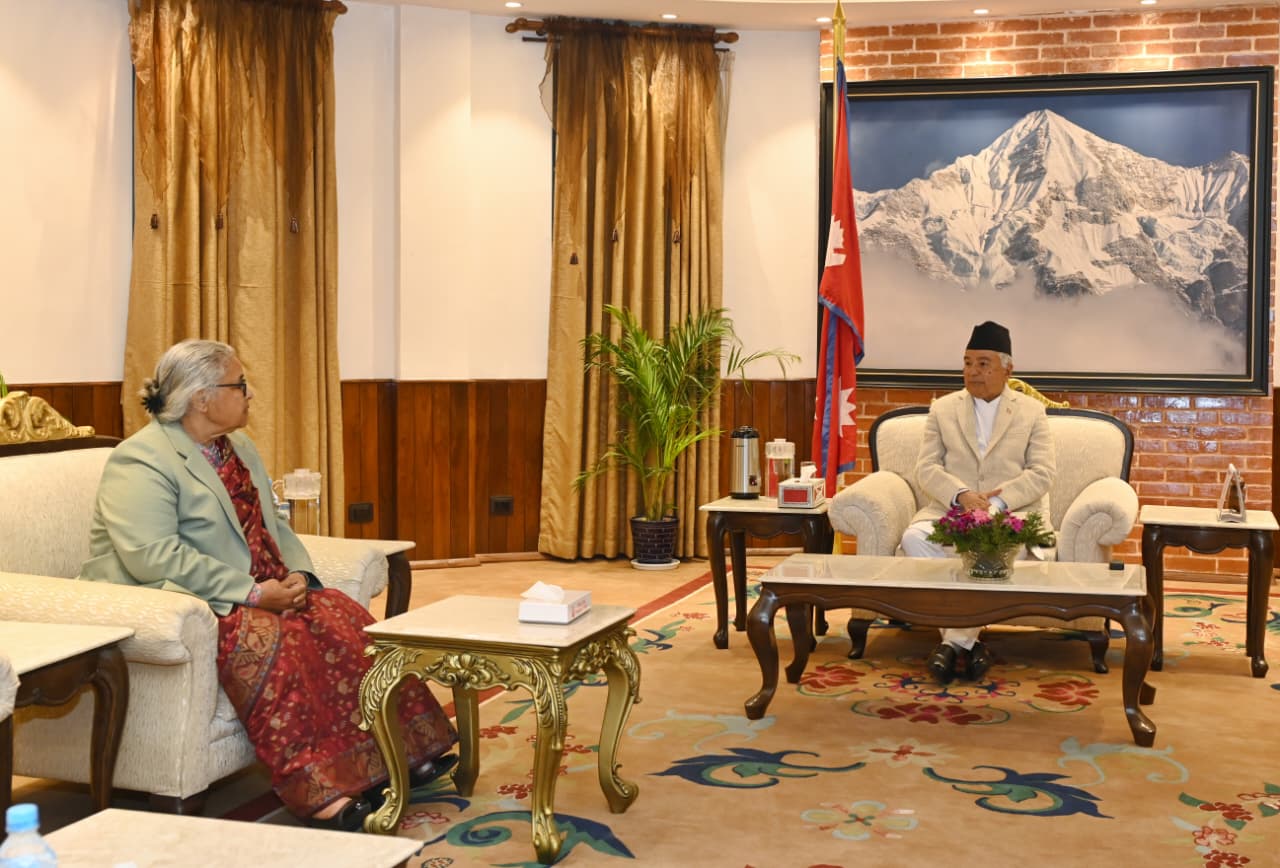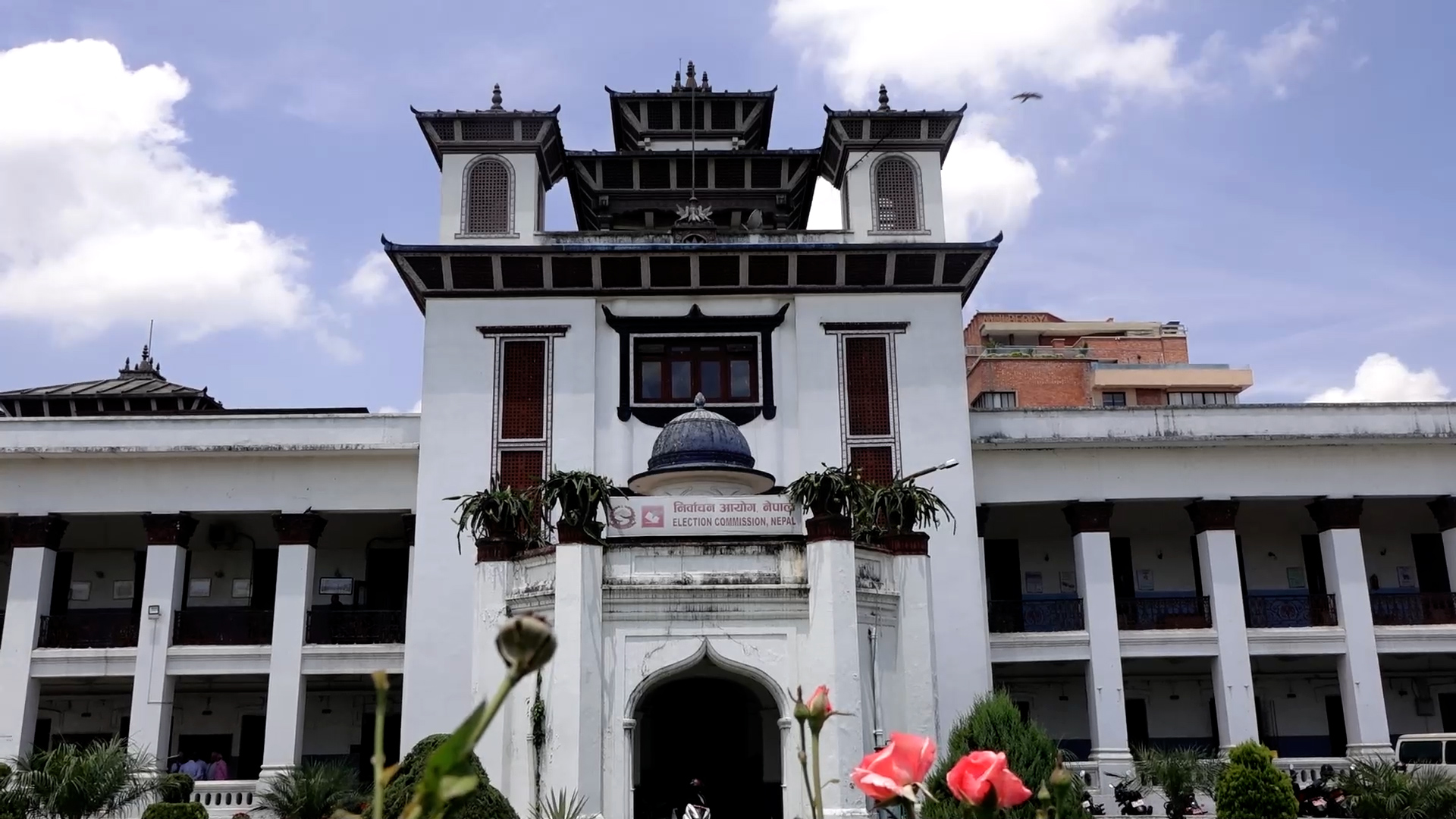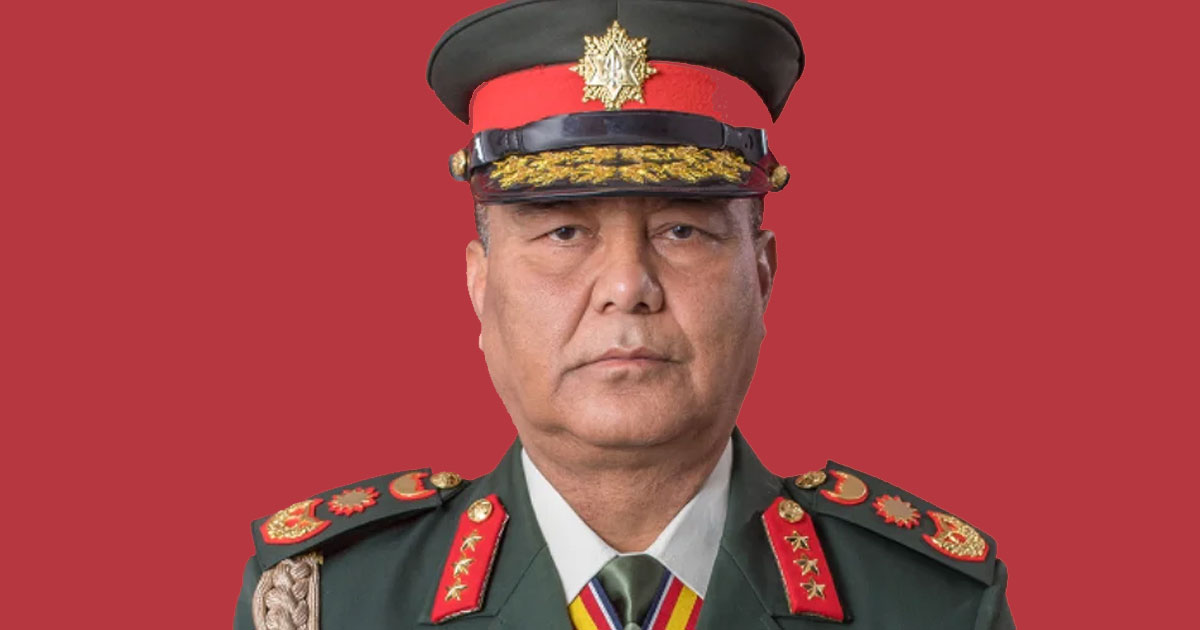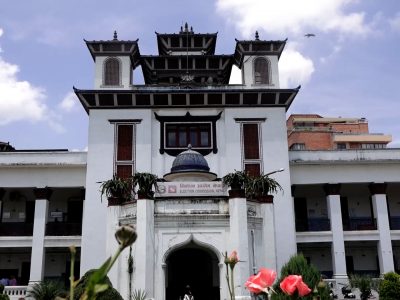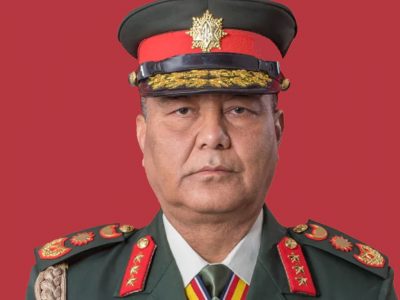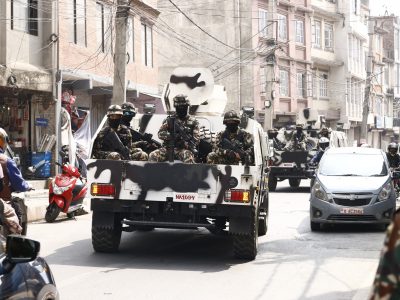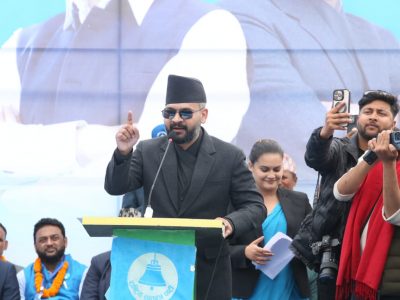Challenges to Nepal’s foreign policy have been caused by psychological factors not geographical
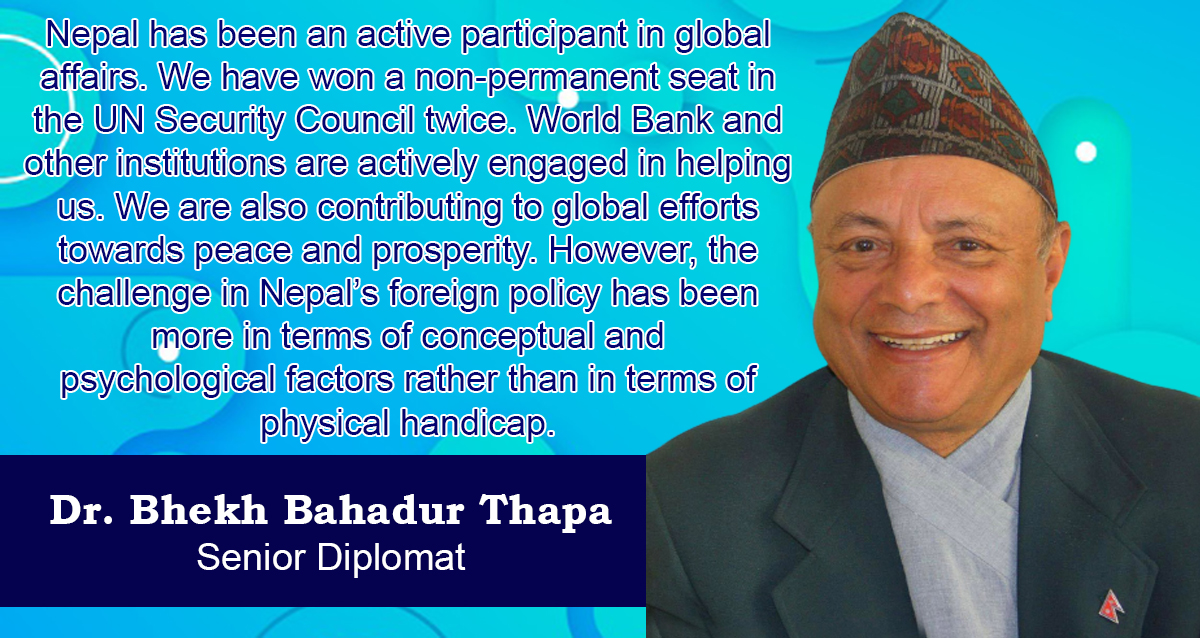
As we in the DC Nepal team embark on this new venture, we asked ourselves – besides the global pandemic, what is a major strategic challenge that afflicts Nepal at the moment? We came to a conclusion that the strained relations with our closest neighbor India stands as a major challenge. One, that requires immediate resolution for the stability and prosperity of Nepal. Within this realm, we could think of no one better than Dr. Bhekh Bahadur Thapa, a seasoned diplomat with an illustrious career. He has been served as an Ambassador of Nepal to India and the United States of America, and has also been Nepal’s Foreign Minister as well as Finance Minister. He still remains as Nepal’s leading figure when it comes to bilateral ties with India because of his extensive experience. The fact that he recently led the Nepal team in the Eminent Persons Group which was established to review bilateral ties and recommend a new way forward stands as a testament to his towering prominence in this realm. Our senior correspondent Shweta Karki conducted the interview.
Ever since Nepal’s founder – King Prithvi Narayan Shah propounded Divya upadesh maxims to guide his successors, Nepal geopolitical vulnerability is registered as a “Yam between Two Boulders”. The Nepali psyche therefore has continually viewed itself as a small state due to factors such as territory, population, relative capability and the overwhelming asymmetry with its two neighbors. Is the small state viewpoint still relevant in the current context and should it be a guide to Nepal’s foreign policy?
Looking at Nepal’s foreign policy from the historical perspective, late King Prithvi Narayan Shah’s campaign led to the Nepal in its current form. The next phase could be termed as that of survival by pleasing the imperial powers to maintain our sovereign status. The third phase was the democratic phase in which Nepal became a part of the global endeavor with active participation and effective partnership in global affairs with interest and capability despite its size and other handicaps as a nation state. King Prithvi Narayan Shah must have been a deep thinker when he coined the phrase “a yam between two boulders” which was an indigenous concept that struck a native chord and became a catchy phrase. Today we are not only repeating it but trying to remind ourselves of the soft power versus hard power dichotomy.
In my dealings with rest of the world regarding Nepal’s foreign policy, one thing I find missing is the wide discourse between intellectuals in the society to cross examine and provide support to the power structure to follow the right course. behind. The intelligentsia is doing its part which adds to the wealth of thinking and puts pressure or support to the governing structure so that anything we do on foreign policy has a national consensus.
The concept of a “yam between two stones” has still got relevance as we are situated between two giant neighbors and squeezed between them in such a way that the yam usually looks at other areas to expand. If you look at the Diva Upadesh, the relevance of the thoughts comes as a reminder of the kind of challenge we face and the course we need to follow. It may not be modern in terms of a concept but the thoughts he injected about the economic and trade aspects of sovereignty are akin to what leaders of today’s world are saying at the moment. King Prithvi Narayan Shah was not only the architect of our nation but also foresaw difficulties coming along the way and warned the future generation of these challenges and how to deal with them.
In addition to your numerous diplomatic portfolios, you recently led the Nepali side at the Eminent Persons Group engagements with India. Despite such close ties with our Southern neighbor, our relations have deteriorated like never before. In the aftermath of the recent territorial dispute, there has been a stalemate in bilateral dialogue. What are Nepal’s options to enhance bilateral ties with India? What have we not done or what should we do better from our side to elevate this bilateral relation that has always been tumultuous turn?
Our relations with India have been close unlike with any other county but at the same time has been filled with challenges on and off. A new phase in Nepal’s foreign policy started after the phase of democratization as it became global. Our desire to be a part of the world found expression. It also coincided with end of Second World War and quest for global peace so that tragedy of the world wars would not be repeated. So, the intellectuals of that period from the United States to other parts of the world including Nepal strived towards the search for peace, stability and preserving human values. Not only the establishment of United Nations and other agencies came into being, but the initiation taken by the third world to launch the Non-aligned Movement was historic as we did not want to be a part of any pole and be guided by borrowed wisdom or course of action decided by others. So, in a sense, we capitalized on the opportunity to be a part of larger exercise in the NAM.
We made our own mark and we adopted shared values and through the UN and other agencies, expanded the horizon of our linkages with the rest of the world. With a limited authority and role, we jumpstarted and moved into a global era. The role played by then leaders of that era from late King Mahendra and intellectuals like Prof. Yadu Nath Khanal and many others carved out an area for Nepal not just to make our voice heard but created a framework of thoughts that identified us as a lover of peace and desirer of development to be an effective partners within global development. In that sense, that was the framework capitalized by the then generation of leaders and we owe gratitude to them.
After the imperial period, the legacy of Nepal’s sovereign status was the Sugauli Treaty signed with the British after the Anglo-Nepalese War defining Nepal’s territory and existence as a sovereign state. We then started engagements with the US and many other countries which was limited in the beginning but expanded after 1960. Nepal had to face many hurdles in the process of moving beyond the isolationist phase to the phase of active participation due to the conventional thought of being landlocked and the psychological thought process of having to live under the shadows of a big brother. We needed to emancipate ourselves from such a mindset. That is when Nepal, led by that generation of leaders, played a major role by not only by joining international institutions and expanding relations with rest of the world, but also by maintaining balanced relations with our neighbors and adopting non-alignment as the core principle of our foreign policy. When I was the ambassador to India, a diplomat mentioned that they had lost Nepal and I retorted by saying that when did they ever have it. These two sentences explain the psychological tug of war in which India sees Nepal as its little brother and wants it to abide by its thinking while Nepal has been keen on asserting its sovereign status regardless of size, economy and other factors we stand on our own and our independence cannot be a gift of someone else.
The conduct Nepal’s foreign policy has been a continuous struggle to prove to the rest of the world that we are part of the global structure, no less and no more, that any other state is. The policy of appeasement of the British adopted by the Ranas added to our isolation but at the same time preserved our sovereign existed through law, letter, practice but we had to deal with many other handicaps like poverty and landlocked status. Democratization ushered us into a new era and the result of which is Nepal’s ever-increasing assertion of its role in the neighborhood and beyond and Nepal today is a proud member of the community of nations at the global stage no less than any other country in the world regardless of size, economy or any other parameter.
We have always believed that we have mutually interdependent relations with India. While we depend on the larger state for the majority of our imports, a new narrative demonstrates that we contribute to its economy and security as well. Particularly, with regards to the thousands of Nepali men who serve under India’s armed forces and Nepal’s unrivaled contribution towards India’s remittance. How can we highlight this newly discovered narrative to further strengthen relations with India? Do you think India will change its Nepal outlook because of this new narrative?
We have to recognize that gradual changes that have taken place since 1950. Changes have taken place but not as rapidly as Nepalese may have wanted it to be. The relations between two countries have been up and down on different occasions. What Nepal has gained is before us both in terms of active participation on equal footing with row although other handicaps are present. From 1960 onwards, there have been three blockades by India. However, the bilateral relationship has generally moved along the right direction with occasional gaps in between. We have to keep on reminding India that we are contributors to national security and economic progress through water resources, human resources, joint ventures and trade. As a part of the Eminent Person’s Group’s exercise, we realized some reports have highlighted that monetary repatriation from Nepal by Indian citizens is higher than what Nepali citizens send from India. Most of us assume that because of trade balance figures, it may be the other way around but it is not the case. Therefore, Nepal-India relations are interdependent rather than a one-way dependency or size dictating the nature of cooperation between the two countries.
Sir, within the geopolitical shifts and the competing interests of the big powers certain concerns have been made apparent. On one hand, we have China and India facing off at the LAC, and on the other we have an overarching U.S. and China rivalry. While we have already committed to BRI, we are also looking to ratify the MCC soon. How can we navigate between the possible impediments and still take advantage of the opportunities whilst adhering to the principles of non-alignment?
Nepal is already a part of the Belt and Road Initiative and our prime minister has assured Nepal’s participation in the Millennium Challenge Corporation compact. Basically, we have to see whether any of these activities affects our neutrality and equal treatment of our neighbors in sovereign terms. Physical handicaps and difficulties have hindered our trade relations with China. Due to open border with India, access to market for people, goods and services is easier. Nepal’s position is unique. We believe in the five principles of peaceful coexistence that came into being from the Bangdung conference. Nepal is not using one of our neighbors against the other. We have been broad-minded in treating our neighbors on equal sovereign terms. However, in terms of trade and other physical factors, it is easier on one side and challenging on the other. Nepal’s relations with China have remained problem free.
The origin of the EPG to look into the broad aspects of Indo-Nepalese relations and for attaining a new height in all related issues was conceived by Prime Minister K. P. Sharma Oli and Indian prime minister and Narendra Modi. In the process of conducting that exercise, we discovered that the many of the issues like the payment situation and other aspects is that the reality is moving at one level and people are not well-briefed on what is being achieved and what is being not. The small state syndrome in Nepal and big brother concept in India have continued and it will be possible to change it only when all unequal arrangements have been dealt with. One area where all of our successive governments have consistently failed is to take the intellectual community and civil society into confidence so that they too become a part of the effort to play a role in promoting out national interests.
Nepal has been an active participant in global affairs. We have won a non-permanent seat in the UN Security Council twice. World Bank and other institutions are actively engaged in helping us. We are also contributing to global efforts towards peace and prosperity. However, the challenge in Nepal’s foreign policy has been more in terms of conceptual and psychological factors rather than in terms of physical handicap.
Sir, recently many have spoken about how diplomatic corps of Nepal has degenerated and decayed in the last several years. To make matters worse, allegations of Ambassadorial positions being on sale for those willing to pay price has also come to fore. In such circumstances, what is your viewpoint regarding the future of Nepal’s diplomatic corps? What is missing and what should be done to bolster Nepal’s diplomatic corps?
Our diplomatic exercise has been less than effective in recent years. In some ways, we are still learning. During my discussion with the German ambassador to Nepal at that time, he told that there had been only one political appointee in the last eighty years. The ratio of political appointees from other countries to Nepal is virtually non-existent except countries run my army and countries in political transition. The thought that anybody can be a diplomat or anyone who can afford it can be an ambassador has crept into the mindset within the major the political parties. Therefore, it is being looked upon as a reward rather than a challenge. So, this is an area that needs an awakening.
During one of my foreign trips, I was invited by our ambassador. In the drawing room of the ambassador’s residence, I saw a photograph of a political leader who was neither the head of state or government. I asked the ambassador how a political leader’s photograph was placed in the drawing room of the official residence of the ambassador. The ambassador replied that as he or she was chosen by that particular leader, he or she would be following the orders of that leader and no one else. Such a mindset highlights that professionalism has disappeared in certain cases. I am not against political appointment as I was myself was ambassador for fourteen years as a political appointee. So, I have no right to abuse others who are being appointed under similar circumstances. But that apart, selectively appointing someone due to one’s proximity with the regime, mindset or values is one thing but that has to be an exception and not a rule.
Facebook Comment
latest Video
Trending News
- This Week
- This Month


